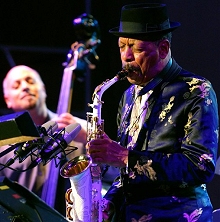Diaa Bekheet | Washington, DC – An album called Change of the Century ushered in a new jazz style that later became known as “Free Jazz”. This music style features songs that break the traditional rules of melody allowing the musicians more latitude to go beyond the limitations of bebop and modal jazz.
The world first learned of “Free Jazz” in 1959 when American Alto Saxophonist Ornette Coleman walked into a Hollywood music studio with bassist Charlie Haden, drummer Billy Higgins and pocket trumpeter Don Cherry. They recorded Change of the Century, which produced the quartet’s most famous song: “Ramblin”:
For the Coleman quartet, it was all exciting, new music. They didn’t want to sound like other traditional jazz players of the time. They sought a greater sense of freedom. Coleman considered sound an invisible emotion combining various moods.

Saxophonist Ornette Coleman performs with his quartet at the Skopje Jazz Festival, in Macedonia, Oct. 2006. (AP)
Change of the Century contains seven compositions by Coleman, including the title cut:
[audio:http://www.voanews.com/MediaAssets2/english/2011_03/jazz_change_of_the_century_sample.mp3] [audio:http://www.voanews.com/MediaAssets2/english/2011_03/jazz_free_coleman_30sec.mp3]Bird Food [audio:http://www.voanews.com/MediaAssets2/english/2011_03/jazz_birdfood_coleman_30sec.mp3]
Coleman’s first album, The Shape of Jazz to Come, had laid the foundation for “Free Jazz.” Many musicians and jazz lovers alike were shocked that the songs had no recognizable chord structure but contained free style simultaneous improvisation.
Some were disappointed, but Coleman believed that jazz must be free. “The Theme you play at the start of a number is the territory,” he explained in a documentary about Free Jazz. “And what comes after, which may have very little to do with it, is the adventure.”
Rolling Stone magazine ranks Coleman’s album, The Shape of Jazz to Come, number 246 on its 2003 list of the 500 greatest albums of all time.
Coleman has lots of fans in Europe. In addition to performing at the prestigious Montreux Jazz Festival in Switzerland, he was the artistic director of the 16th annual Meltdown festival held in London’s Southbank Centre. Previous curators include David Bowie, (Steven Patrick) Morrissey, Nick Cave, Patti Smith, Jarvis Cocker, Massive Attack, John Peel and Lee ‘Scratch’ Perry.
In 2007, Coleman received a Grammy award for Lifetime Achievement and a Pulitzer Prize in the music category for “Sound Grammar”. He is only the second jazz composer to ever win a Pulitzer.
The ‘Master of Free Jazz,’ was born this month, on March 9, 1930. He turned 81.
For more on jazz music, listen to VOA’s Jazz America
Diaa Bekheet

2 responses to “Music When You Want It: Ornette Coleman’s Free Jazz”
…thank you for all this jazz…
Salute to Coleman.
The Shape of Jazz to Come is an album ahead of it’s time. It even took some spotlight away from Miles’ Kind of Blue album at the time.